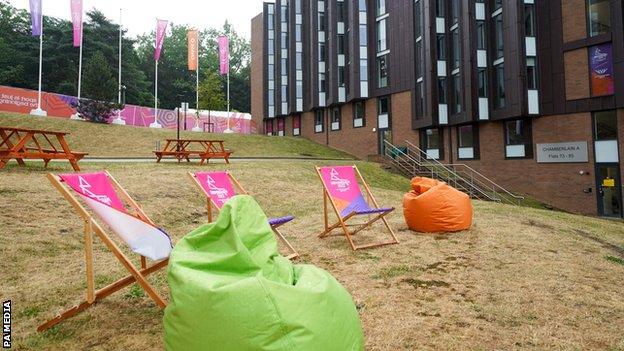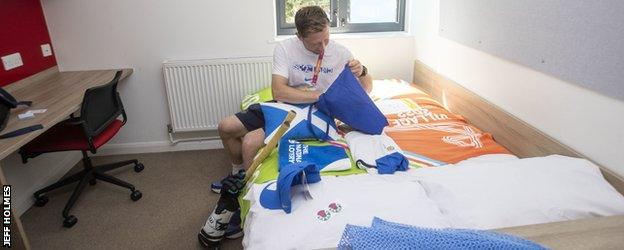Commonwealth Games 2022: What is an athletes' village really like?
- Published

The University of Birmingham campus is one of four separate athletes' villages
Birmingham 2022 Commonwealth Games |
|---|
Hosts: Birmingham Dates: 28 July to 8 August |
Coverage: Watch live on BBC TV with extra streams on BBC iPlayer, Red Button, BBC Sport website and BBC Sport mobile app |
Some already knew and had dealt with the disappointment. But others were hearing the bad news for the first time.
"Four different villages? Naw, surely not..." one athlete said incredulously when told competitors at the Commonwealth Games would be spread across several different residences over the next couple of weeks.
Partly due to the splintered nature of the venues and partly for Covid-related reasons, there will not be one all-encompassing athletes' village for the Birmingham event.
A large contingent will be billeted at one of the city's universities, but the boxers, weightlifters, table tennis players and badminton sorts, among others, will be almost 10 miles east at the National Exhibition Centre, penned in by the ring road and the airport.
Another batch - rugby players, wrestlers, judokas and bowlers - will be 20-odd miles away in Warwick, while the cyclists will be in London, where they will compete at the Olympic Park.
"In a way, that's a good thing we're down there, out of the way, because it keeps our heads switched on," double Olympic medallist Jack Carlin says. "Don't get me wrong, I'd much prefer to be in the village, but we've got a busy few weeks ahead."
So what is the village like, Jack? "Oh come on, pal, I can't tell you that. Not with a camera on me anyway..."
'You can end up overwhelmed by village life'
It would likely be fair to deduce that the Paisley sprinter had a right good kick at the ball post-competition in Tokyo, despite the Covid constraints in the village.
Judoka Sarah Adlington coyly confirms her "village experience was really good" in Japan, too, checking herself before divulging any compromising details. And long-distance runner Eilish McColgan admits to changing her flight so she could go to her first closing ceremony and experience all the capers that go with it.
But the scale of an Olympic village dwarfs anything the Commonwealths can offer, even amid the worst of the pandemic restrictions.
"It's a different world," swimmer Ross Murdoch says. "When you see the numbers written down, it doesn't really make sense, but when you see 30 skyscrapers full of athletes… in Rio, they could fit three or four 747 jets in the dining hall. It's colossal."
McColgan adds: "London was my first real experience and I was just overwhelmed by it. It was so much bigger than I imagined. There were post offices, banks, nail salons. It was a city within four walls.
"You can end up getting distracted. I mean, you could have sushi at 4am if you wanted."
Ask almost any previous village resident and they'll gush about the food hall.
For some, like heavyweight Adlington, the chance to 'fuel' 24-hours a day is almost too good to be true. Others have to be more judicious. After all, these are athletes with potentially the biggest moment of their careers looming.
Double badminton medallist Kirsty Gilmour, who has been to three Commonwealths as well as the Olympics, plays a little game every meal-time.
"It's called 'what sport do they do?' and it's just me looking at people's plates and guessing," she says. "I once watched a Kenyan eat nothing but a massive pile of bread rolls... must have been a marathon runner."
But, while Gilmour and shooter Seonaid McIntosh confess to people-watching, wheelchair athlete Sammi Kinghorn has her eyes fixed on something else.
"You go around scouting out the bad stuff that you can eat as soon as you've raced," she says conspiratorially.
"I remember, at the Paralympics, there was a McDonalds, which was free… free! It's always quite sad when you come out of it and actually have to pay for your food again. And there's normally a little bar as well."

Scotland's male hockey players were the first to arrive in Birmingham and were greeted with a special Games welcome pack. Inside was a scatter cushion, Saltire towel, good luck letter and drawing from local school children, a gift from local community groups and a specially-made white tracksuit top featuring the team's motto, "clear heads, brave hearts", stitched into the inside.
'If people want a party, us swimmers get a call'
Ah yes, booze. Pour that into an already heady brew of athletes in the prime of their lives, away from their usual spartan regime, out of the public eye, and brim-full of energy and it's little wonder that all sorts ensues.
The stories of enormous condom supplies having to be quickly replenished and competitors 'making new friends' from around the globe are a staple of these events. And that's sometimes even before the actual sport starts.
The withering stare wielded by Team Scotland chef de mission Elinor Middlemiss when asked how she would deal with any carry on in the village could neuter even the most emboldened of athletes - but not all are so easily cowed.
"You hear the rumours about who are the wildest... and the swimmers are always the ones mentioned," McIntosh says.
"Yeah, swimmers, definitely," Kinghorn concurs.
"If people want to have a party, generally us swimmers get a call…" says former Commonwealth champion Ross Murdoch.
In mitigation, it should be pointed out that their sport traditionally starts at the very beginning of such Games, so the athletes tend to be left with time post-event to make the most of their surroundings.
And, for Murdoch, a Games veteran, that is about more than just going out on the lash or "getting up to no good", as he euphemistically puts it.
"Nobody breaks the rules… well, maybe they're a bit out of shape sometimes, but it's part of the fun," he says. "And, actually, some of my fondest memories in Gold Coast were us all watching the diving team. Going along to cheer them on, then nipping to the pub during the breaks, before heading back.
"Those experiences away from competing often become the ones you remember. I forget what happened during the six days of the meet… it's the six days afterwards that meant the most and really brought us together as a team, as a family."
Hammer thrower Mark Dry recognises that sentiment. And it's why he describes the lack of a single village in Birmingham as a source of "sadness".
"It's an amazing place to be," he adds. "You're surrounded by mates from around the world in all the other sports and it's like being in one big family. The buzz that Glasgow had in the city in 2014, that's what the village feels like all the time.
"There will only be a group of us in Birmingham, just like there was only one in Gold Coast, and one in Glasgow. It is a special thing to be a part of and that's why I'm determined to make the most of it."